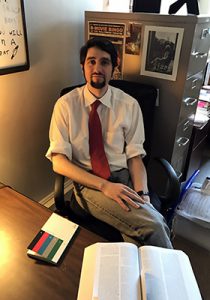Two questions entered my mind when I found this tweet.
A computer makes poetry. Where is the humanity? How does that work as a teaching tool?
Last week my students @WabashCollege watched a computer make poetry. This week we read Frankenstein. Center Hall is overrun with machines.
— Derek Mong (@derek_mong) February 5, 2017
Thanks to the author of that tweet, Assistant Professor of English Derek Mong, I discovered the answers had all the elements of a good Wabash story: Enduring Questions (EQ), a dash of Kurt Vonnegut, the efforts of a computer, and the requisite suspicions.

Students in his EQ class had just read Vonnegut’s “EPICAC,” the classic 1950s short story where one unromantic computer programmer uses a supercomputer to generate love poetry to woo a co-worker. Being a professor of American literature and poetry, Mong knew that computers have created poetry in chance fashion, and the results reside an avant-garde world of poetry. Setting out to further engage his students, he went digging.
“I pulled the first links that looked sort of interesting, that I could clickably generate poetry,” he says. “I brought them into class and asked the students is this poetry knowing it’s a computer that made it?”
Mong says his students didn’t write it off immediately, but there were suspicions. The computer could recognize syllable length and was filling in spaces by surfing text. Click a button and a quatrain or a haiku was generated. Seeing it work made them curious.
From there, Mong had his students do a found-language experiment. Collect 10 sentences at random in the library, put them down in a notebook, take that material home, and create a poem or short story using the found material. Now, it becomes a teaching tool, because it creates limits similar to how the computer operates.
“It changes our idea of what authorship is,” Mong says. “Our associations with poetry are individual genius at a desk creating beauty. That’s what Vonnegut’s story pokes at. If a computer can do this, what are our ideas about the creation of literature? It’s useful intellectually for students to ask what are the possibilities of computational poetry, and for me what are the ideas of how poetry can change.”
Perhaps that change can inject an element of fun.
“A lot of what’s happening with these poems is play,” he says. “Can this be a game? Can I go on to write poems that are playful, game-like, and fun?”